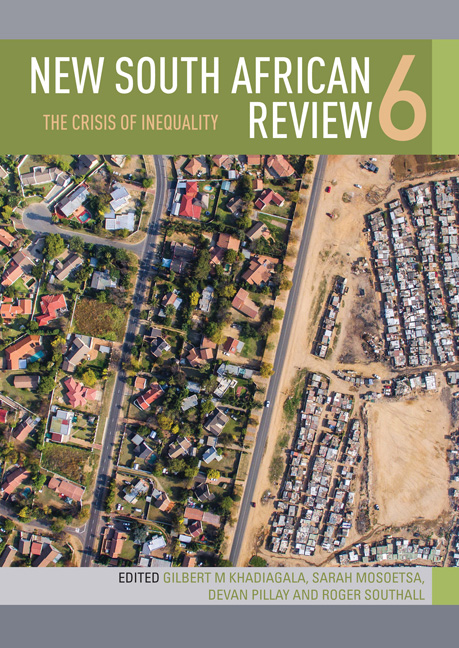Book contents
- Frontmatter
- Contents
- List of tables and figures
- INTRODUCTION: The global crisis of inequality and its South African manifestations
- PART 1 INEQUALITY AND CLASS: POLARITIES AND POLICIES
- CHAPTER 1 Inequality in South Africa
- CHAPTER 2 A national minimum wage in South Africa: A tool to reduce inequality?
- CHAPTER 3 The politics of poverty and inequality in South Africa: Connectivity, abjections and the problem of measurement
- CHAPTER 4 The financialisation of the poor and the reproduction of inequality
- PART 2 THE POLITICS OF INEQUALITY
- PART 3 SOCIAL DIMENSIONS OF INEQUALITY
- PART 4 LAND AND ENVIRONMENT
- Contributors
- Index
CHAPTER 3 - The politics of poverty and inequality in South Africa: Connectivity, abjections and the problem of measurement
from PART 1 - INEQUALITY AND CLASS: POLARITIES AND POLICIES
Published online by Cambridge University Press: 23 March 2018
- Frontmatter
- Contents
- List of tables and figures
- INTRODUCTION: The global crisis of inequality and its South African manifestations
- PART 1 INEQUALITY AND CLASS: POLARITIES AND POLICIES
- CHAPTER 1 Inequality in South Africa
- CHAPTER 2 A national minimum wage in South Africa: A tool to reduce inequality?
- CHAPTER 3 The politics of poverty and inequality in South Africa: Connectivity, abjections and the problem of measurement
- CHAPTER 4 The financialisation of the poor and the reproduction of inequality
- PART 2 THE POLITICS OF INEQUALITY
- PART 3 SOCIAL DIMENSIONS OF INEQUALITY
- PART 4 LAND AND ENVIRONMENT
- Contributors
- Index
Summary
In this chapter I will add to chapters 1 and 2 by discussing what is knowable about poverty and inequality in South Africa and some characteristics of what it means to measure. The importance of measurement is to try and catalyse social change by giving citizens and policy makers the knowledge they need to act and spend wisely for a better South Africa. However, there are problems in the calculation of economic statistics everywhere which are related to the production of ‘bad statistics’ (Andreas and Greenhill 2010: 7); and more generically to the discipline-based problems in the epistemology of economics. Mainstream economics assumes a number of relationships before it even attempts to count, and frames out issues of market imperfections, informality, criminality and extra-economic factors which affect distributional outcomes, such as power. For limits of time and space this article will not cover this discipline-based debate, but will focus instead on the more recent literature on the reactivity of measurement, where the act of measurement partly or wholly produces the thing in question (Espeland and Sauder 2007; MacKenzie 2011: 1784). This reactivity of measurement was described by Engle Merry (2011) as where the ‘production and usage’ of an indicator has both a knowledge effect and a governance effect: the former is generated as the gathering and organisation of information creates the impression of a standardised and rule-based thing, while the latter is produced as the numbers are used in the management of people. Moreover, it is ‘often the imperative to govern that provides the rationale and the resources for producing the indicator in the first place’ (Jerven 2013: 5). The domain of poverty measurement displays these attributes of reactivity and is the subject of this chapter.
As Jerven (2013) noted recently in a timely book on ‘poor numbers’, the accuracy of numbers is not a problem specific to Africa or exclusive to debates on economic development. However, ‘a surprisingly small number of studies examine the role, power, and quality of the numbers applied to issues concerning African economic development’ (Jerven 2013: 1).
- Type
- Chapter
- Information
- New South African Review 6The Crisis of Inequality, pp. 66 - 83Publisher: Wits University PressPrint publication year: 2018



